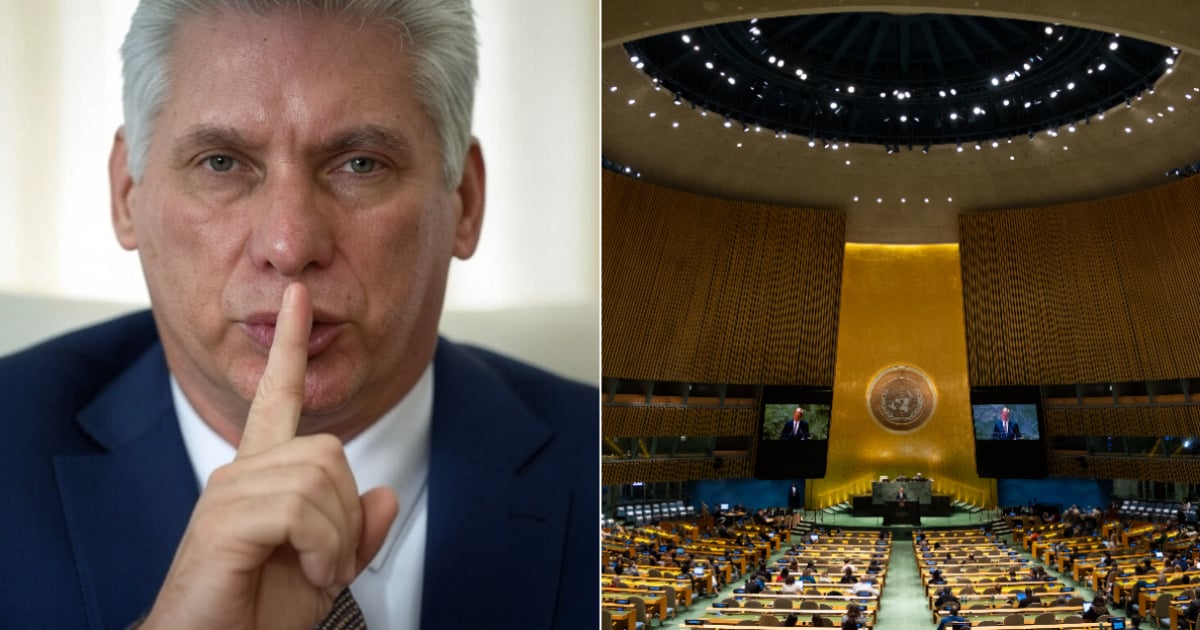Cuba's state-run media has opted for complete silence regarding a diplomatic incident that, under different circumstances, might have featured prominently in their headlines: Cuba's abstention in the recent United Nations General Assembly vote condemning Russia's invasion of Ukraine. What stands out most is not just the silence of state media but the fact that, on this occasion, Havana's position at the UN coincided with the stance of Donald Trump's administration.
On February 23rd, the United States, led by Trump, was one of 18 nations that voted against the resolution, aligning with regimes such as Vladimir Putin's Russia, Kim Jong-un's North Korea, and Alexander Lukashenko's Belarus. Meanwhile, 93 countries supported the condemnation of Moscow, and 65 abstained, including Cuba, China, Venezuela, and Iran. Nevertheless, Cuban media, including Granma, Cubadebate, Trabajadores, and Juventud Rebelde, have completely ignored the alignment of Cuba's vote with that of the United States.
This omission is even more striking considering the Cuban state media's track record of seizing every opportunity to criticize Washington, especially under a Republican administration that "tightened the embargo and implemented over 250 measures." Yet, on this occasion, Havana has chosen to avoid any mention that could raise questions about Cuba's diplomatic alignment and contradictions in its foreign policy.
This silence contrasts with previous coverage by these same outlets, which have often defended Cuba's "sovereign and independent" stance in the Russia-Ukraine conflict. Back in February 2022, when the war was just beginning, Cubadebate and other regime-aligned media were quick to justify the Cuban government's position alongside Russia, while blaming the West for provoking the conflict.
A Look at UN Voting History on Russia's Invasion of Ukraine
Since the start of Russia's invasion of Ukraine in February 2022, the United Nations General Assembly has conducted several votes to condemn Russia's actions and demand the withdrawal of its troops from Ukrainian territory. Here are the main resolutions and positions adopted by Cuba and the United States, along with the countries that voted against or abstained:
1. Resolution ES-11/1 (March 2022): "Aggression against Ukraine." Voting outcome: 141 in favor, 5 against, and 35 abstentions. Countries voting against: Russia, Belarus, North Korea, Eritrea, and Syria. Notable abstentions: China, India, South Africa, and Cuba. U.S. stance: Voted in favor of the resolution.
2. Resolution ES-11/4 (October 2022): "Territorial Integrity of Ukraine: Defending the Principles of the UN Charter." Voting outcome: 143 in favor, 5 against, and 35 abstentions. Countries voting against: Russia, Belarus, North Korea, Nicaragua, and Syria. Notable abstentions: China, India, Pakistan, and Cuba. U.S. stance: Voted in favor of the resolution.
3. February 2025 Resolution: "Principles of the UN Charter Underpinning a Comprehensive, Just, and Lasting Peace in Ukraine." Voting outcome: 93 in favor, 18 against, and 65 abstentions. Countries voting against: United States, Russia, Belarus, North Korea, Eritrea, Hungary, Israel, and Syria, among others. Notable abstentions: China, India, South Africa, and Cuba. U.S. stance: For the first time, voted against the resolution, aligning with Russia and other countries opposing condemnation of the invasion.
It's significant to note that in the first two resolutions, Cuba chose to abstain, maintaining a neutral stance. In the third resolution, though it also abstained, the U.S. position changed dramatically by voting against, leading to an unexpected alignment with Russia and other countries that support or do not condemn the invasion.
This change in the U.S. stance has been the subject of analysis and criticism internationally, as it represents a significant departure from its traditional support for Ukraine. However, in Cuban official media, the silence is palpable.
Additionally, the decrease in votes in favor of the resolutions between 2022 and 2025 indicates a potential erosion of international consensus regarding the condemnation of Russia's actions in Ukraine. Geopolitical factors, changes in government administrations, and strategic realignments could be influencing these variations in UN General Assembly voting, something the Havana regime has remained silent about this time.
The muteness of official media in this new scenario highlights their informational strategy: emphasizing what suits the government's narrative and silencing any event that might generate questions or discomfort within their ranks.
Key Questions on Cuba's UN Voting Silence
Why did Cuban state media remain silent about the UN vote?
Cuban state media likely remained silent to avoid highlighting contradictions in Cuba's foreign policy and its unexpected alignment with the United States in the UN vote.
How does Cuba's abstention compare to its previous UN votes?
Cuba has consistently abstained in UN votes condemning Russia's actions in Ukraine, maintaining a neutral stance, which contrasts with the U.S.'s recent vote against the resolution.
What implications does the change in U.S. voting have?
The U.S.'s change in voting represents a significant departure from its traditional support for Ukraine, aligning unexpectedly with Russia and other non-condemning countries, raising international analysis and criticism.
